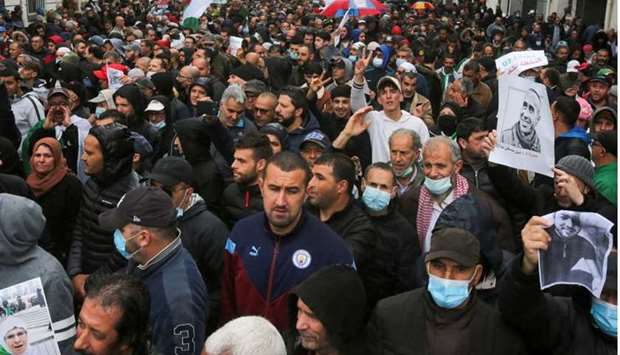Algeria's protest movement, which shook the country by ousting its veteran president in 2019, faces a critical test for its survival on Friday, with police poised to confront any who take to the streets.
The movement, known as Hirak, is leaderless and unorganised, but after a year-long hiatus due to the Covid-19 pandemic it revived in February, bringing out demonstrators every Friday since then to demand wholesale political change.
Though the protests are now much smaller than at their peak, many of the thousands who still regularly march each week appear ready to brave a harsher government approach.
"We will not stop marching. We will remain peaceful," said a well-known Hirak figure, Samir Belarbi, adding he did not trust the authorities to make necessary changes except under pressure.
Protesters want the entire elite that has ruled since independence in 1962 to be replaced, an end to corruption and the army's withdrawal from politics.
Since Hirak began two years ago, then flooding the capital with hundreds of thousands of protesters, the ruling authorities have attempted to sidestep its biggest demands while letting street rallies continue.
That policy now seems to be at an end, with the Interior Ministry saying this month protests would require an official permit naming the organisers as well as a start and end time.
"Life needs to go back to normal," said an official Algerian source when asked by Reuters if security forces would prevent any further protests, without elaborating.
Last Friday, the only Friday since the Interior Ministry proclamation, came during the Eid al-Fitr holiday, so only a very small number of protesters gathered in central Algiers - and were quickly dispersed.
It means this coming Friday may represent a first real test of whether the security forces are prepared to stamp out a major protest and whether the demonstrators are able to keep their movement on the streets.
Though the Algerian authorities - popularly known as the "pouvoir" - had tolerated protests, publicly praising Hirak as a movement of national renewal, they also cracked down with arrests, prompting criticism from international rights groups.
During last Friday's small protests, police escalated their response, detaining dozens of activists as well as journalists, though most were later released.
"The past Friday's brutal repression showed the nature of a regime that refuses deep political changes," said Belarbi, who was detained for several months earlier in the protests.
The crackdown comes ahead of parliament elections in June. The vote will be the third since the start of the protests - and like the others will be boycotted by Hirak supporters.
In December 2019 Abdelmadjid Tebboune was elected president in a vote that officially had 40% turnout. In November a referendum approving changes to the constitution that he proposed as a conciliatory gesture to Hirak had turnout of only 25%.
"It is no longer time for marching but for working and putting Algeria's economy back on track," said the official, adding that the collapse in oil revenue and impact of the pandemic meant Algeria had no space to focus on anything else.
That government response has angered protesters. "It is a dialogue of the deaf between Hirak and the pouvoir," said Mezouan Said, an activist. "We want them to leave and they just tell us to vote. They have to go. They must go," he said.

Demonstrators march during a protest demanding political change, in Algiers, Algeria April 16.
